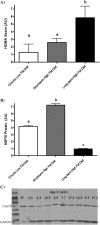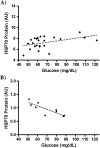Aging does not reduce heat shock protein 70 in the absence of chronic insulin resistance
- PMID: 22403054
- PMCID: PMC3437965
- DOI: 10.1093/gerona/gls008
Aging does not reduce heat shock protein 70 in the absence of chronic insulin resistance
Abstract
Heat shock protein (HSP)70 decreases with age. Often aging is associated with coincident insulin resistance and higher blood glucose levels, which also associate with lower HSP70. We aimed to understand how these factors interrelate through a series of experiments using vervet monkeys (Chlorocebus aethiops sabaeous). Monkeys (n = 284, 4-25 years) fed low-fat diets showed no association of muscle HSP70 with age (r = .04, p = .53), but levels were highly heritable. Insulin resistance was induced in vervet monkeys with high-fat diets, and muscle biopsies were taken after 0.3 or 6 years. HSP70 levels were significantly greater after 0.3 years (+72%, p < .05) but were significantly lower following 6 years of high-fat diet (-77%, p < .05). Associations with glucose also switched from being positive (r = .44, p = .03) to strikingly negative (r = -.84, p < .001) with increasing insulin resistance. In conclusion, a low-fat diet may preserve tissue HSP70 and health with aging, whereas high-fat diets, insulin resistance, and genetic factors may be more important than age for determining HSP70 levels.
Figures



Similar articles
-
Muscle heat shock protein 70 predicts insulin resistance with aging.J Gerontol A Biol Sci Med Sci. 2015 Feb;70(2):155-62. doi: 10.1093/gerona/glu015. Epub 2014 Feb 14. J Gerontol A Biol Sci Med Sci. 2015. PMID: 24532784 Free PMC article.
-
Effects of heated hydrotherapy on muscle HSP70 and glucose metabolism in old and young vervet monkeys.Cell Stress Chaperones. 2016 Jul;21(4):717-25. doi: 10.1007/s12192-016-0699-z. Epub 2016 May 17. Cell Stress Chaperones. 2016. PMID: 27188431 Free PMC article.
-
Heat treatment improves glucose tolerance and prevents skeletal muscle insulin resistance in rats fed a high-fat diet.Diabetes. 2009 Mar;58(3):567-78. doi: 10.2337/db08-1070. Epub 2008 Dec 10. Diabetes. 2009. PMID: 19073766 Free PMC article.
-
The Effect of Low Glycemic Index and Glycemic Load Diets on Hepatic Fat Mass, Insulin Resistance, and Blood Lipid Panels in Individuals with Nonalcoholic Fatty Liver Disease.Metab Syndr Relat Disord. 2019 Oct;17(8):389-396. doi: 10.1089/met.2019.0038. Epub 2019 Jul 15. Metab Syndr Relat Disord. 2019. PMID: 31305201 Review.
-
[The role of hsp60 and hsp70 kDa heat shock protein families in different types of diabetes mellitus].Orv Hetil. 2004 Feb 29;145(9):467-72. Orv Hetil. 2004. PMID: 15077478 Review. Hungarian.
Cited by
-
Oral supplementations with L-glutamine or L-alanyl-L-glutamine do not change metabolic alterations induced by long-term high-fat diet in the B6.129F2/J mouse model of insulin resistance.Mol Cell Biochem. 2016 Jan;411(1-2):351-62. doi: 10.1007/s11010-015-2597-6. Epub 2015 Nov 3. Mol Cell Biochem. 2016. PMID: 26530165
-
Effects of resistance training on heat shock response (HSR), HSP70 expression, oxidative stress, inflammation, and metabolism in middle-aged people.J Physiol Biochem. 2024 Feb;80(1):161-173. doi: 10.1007/s13105-023-00994-w. Epub 2023 Nov 6. J Physiol Biochem. 2024. PMID: 37930617
-
The importance of the cellular stress response in the pathogenesis and treatment of type 2 diabetes.Cell Stress Chaperones. 2014 Jul;19(4):447-64. doi: 10.1007/s12192-014-0493-8. Epub 2014 Feb 13. Cell Stress Chaperones. 2014. PMID: 24523032 Free PMC article.
-
Integrated omics analysis reveals sirtuin signaling is central to hepatic response to a high fructose diet.BMC Genomics. 2021 Dec 3;22(1):870. doi: 10.1186/s12864-021-08166-0. BMC Genomics. 2021. PMID: 34861817 Free PMC article.
-
Alfalfa-derived HSP70 administered intranasally improves insulin sensitivity in mice.Cell Stress Chaperones. 2018 Mar;23(2):189-194. doi: 10.1007/s12192-017-0835-4. Epub 2017 Aug 18. Cell Stress Chaperones. 2018. PMID: 28822083 Free PMC article.
References
-
- Gutsmann-Conrad A, Pahlavani MA, Heydari AR, Richardson A. Expression of heat shock protein 70 decreases with age in hepatocytes and splenocytes from female rats. Mech Ageing Dev. 1999;107(3):255–270. - PubMed
-
- Gagliano N, Grizzi F, Annoni G. Mechanisms of aging and liver functions. Dig Dis. 2007;25(2):118–123. - PubMed
-
- Heydari AR, You S, Takahashi R, Gutsmann-Conrad A, Sarge KD, Richardson A. Age-related alterations in the activation of heat shock transcription factor 1 in rat hepatocytes. Exp Cell Res. 2000;256(1):83–93. - PubMed
-
- Rea IM, McNerlan S, Pockley AG. Serum heat shock protein and anti-heat shock protein antibody levels in aging. Exp Gerontol. 2001;36(2):341–352. - PubMed
Publication types
MeSH terms
Substances
Grants and funding
LinkOut - more resources
Full Text Sources
Medical

